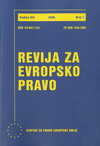ACCESS TO THE EU FINANCIAL MARKET VIA EQUIVALENCE – NEW DEVELOPMENTS IN THE LIGHT OF BREXIT
PRISTUP FINANSIJSKOM TRŽIŠTU EVROPSKE UNIJE PUTEM REŽIMA EKVIVALENTNOSTI – NOVI PRAVCI RAZVOJA INSTITUTA U SVETLU BREXIT-A
Author(s): Aleksandra VišekrunaSubject(s): EU-Accession / EU-DEvelopment, EU-Legislation
Published by: Удружење за европско право - Центар за право Европске уније
Keywords: European Union; Brexit; financial services; equivalence; Single Market access
Summary/Abstract: Single Market grants its participants many opportunities for cross-border provision of services. Non-member states of the European Union can gain the access to the Single Market under certain conditions, but that access is far more limited than the Member States'. So far, several methods of access, varying in necessary prerequisites and granted rights, have been recognized. Determination of equivalence between the legal system of non-member states and the EU is recognized as a mechanism that potentially grants the widest set of rights (apart from passport which is granted only to companies from the Member States). This regime has been successfully applied for the past two decades, but in recent years it has gone through a significant transformation, partially but not entirely due to Brexit.After Brexit, the United Kingdom has the status of a third country and is subject to the application of the single market access regime applicable to these parties. Nevertheless, unlike other "third countries", the UK was Member State for several decades and its relations with the EU are specific. They have a strong disintegration effect – the UK is withdrawing from the EU, but practical circumstances impose the need to regulate their relations.The paper provides an overview of models for regulating relations between the EU and the UK and the basic characteristics of equivalence, which is identified as a mechanism that grants the widest access rights to the EU financial market for third countries. Afterwards, the new directions of development of this institute will be reviewed primarily in the light of Brexit.The results of the research show that equivalence has undergone a significant transformation with the EU introducing more stringent rules on Single Market access, which is partially due to Brexit, but it is also part of the wider policy agenda to protect financial stability and resilience of the Single Market. Withdrawal from the EU without a determined framework for future relations in the realm of financial services has posed significant challenges for both EU and the UK. EU has to establish financial markets' infrastructure that can match the London market, which has proven challenging in certain areas (e. g. central counterparties), whereas the UK has to balance the wish to gain Single Market access (hence aligning with the EU rules) and making its market more competitive through innovative legislative solutions (hence risking non-equivalence with the EU).
Journal: Revija za evropsko pravo
- Issue Year: 24/2022
- Issue No: 1
- Page Range: 99-120
- Page Count: 22
- Language: Serbian

